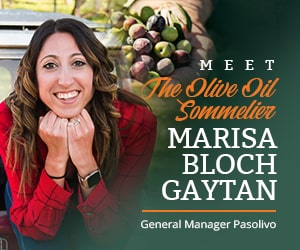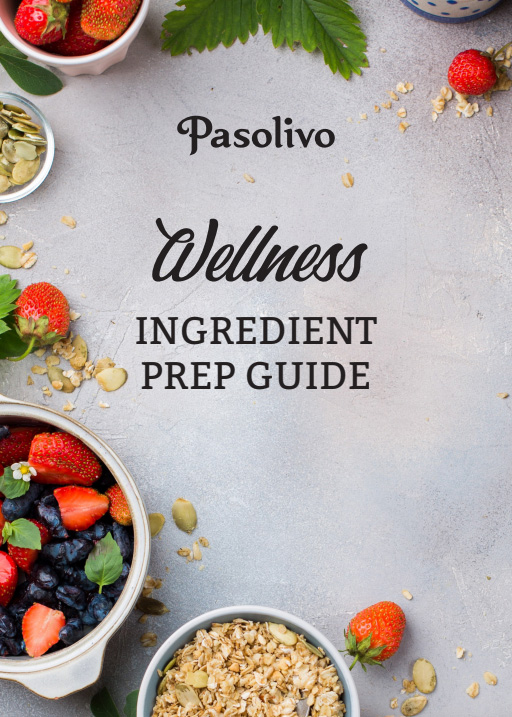As Pasolivo’s level two olive oil sommelier and master blender, I’m sharing some tips and tricks the experts use for the how to’s of all things extra virgin olive oil. The California olive oil industry is fast growing, and there are many things consumers do not know when it comes to quality extra virgin olive oil.
How To Taste Olive Oil:
If you are a professional olive oil taster, or just want to experience how the experts properly taste, there is a process to follow. By following the steps below, you will be well on your way to properly tasting this liquid gold!
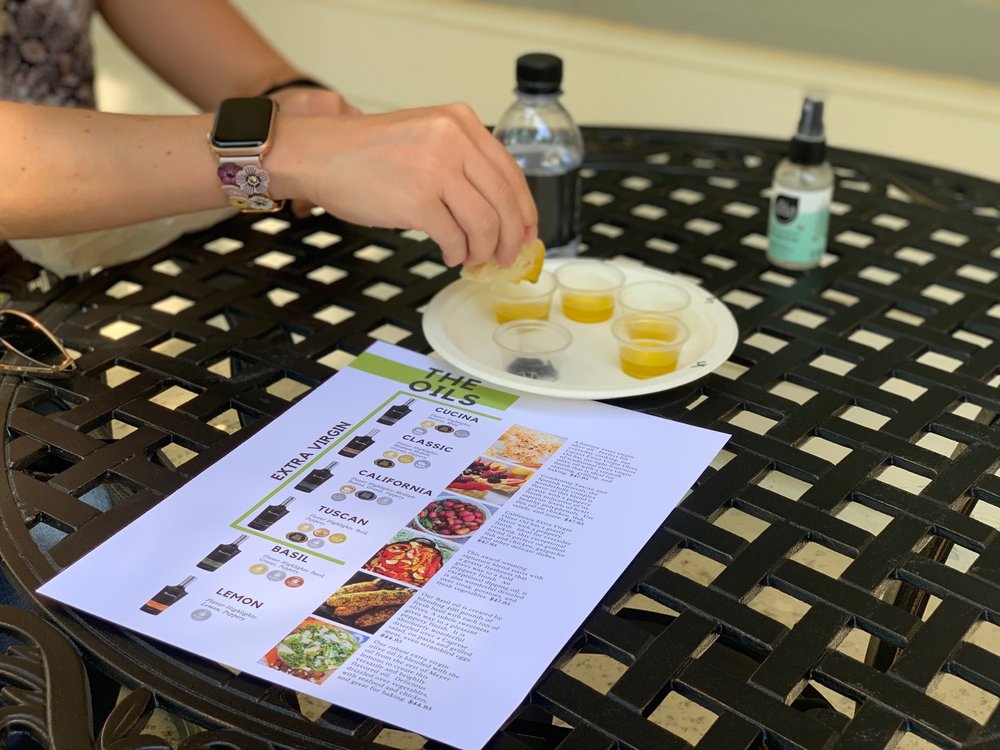
• Experts always taste extra virgin olive oil in a dark blue tapered glass. It could almost be compared to a votive candle holder. The reason for this is to help trap the aromas in the glass and to not be able to see the color of the olive oil. Many people think that color of the olive oil is an indicator of the quality, but that is not true.
• Once your oil is poured into your dark blue glass (or other vessel), you are going to want to cup the bottom of the glass in the palm of your hand and cover the top of it with the other to embark on what we call the 4 Ss of tasting EVOO.
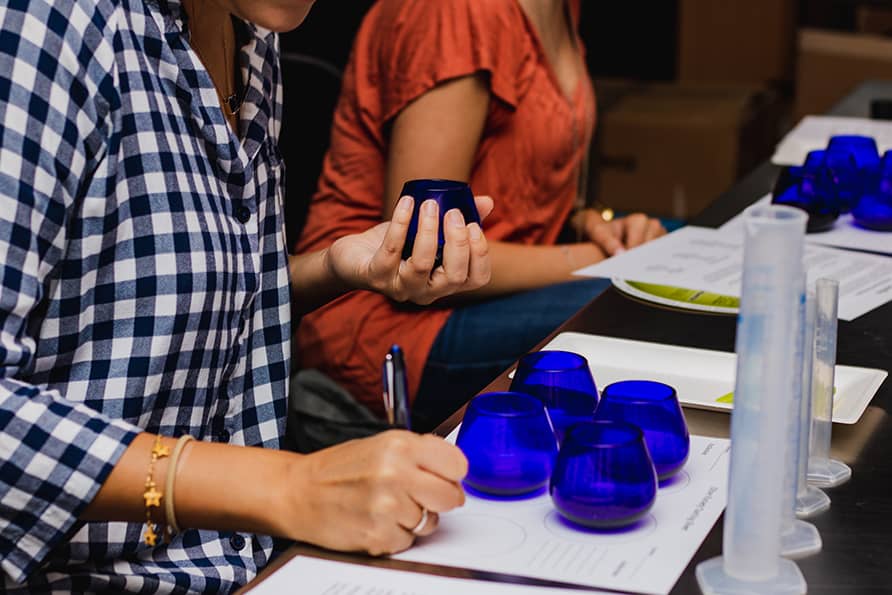
– First you are going to Swirl the extra virgin olive oil. This combined with how you are holding the glass (mentioned above) is going to help “warm” the olive oil and release any aromas it has.
– Then you want to Smell the extra virgin olive oil. This is where you are going to pick up what us tasters like to call the fruitiness of the olive oil. You will pick up aromas such as green banana, ripe banana, tomato leaf, almond, etc.
– Next you want to Sip or Slurp the extra virgin olive oil. Now I say slurp because it is important to aerate the oil as you sip it to really catch the flavors on your tongue and the sides of your mouth. This is when you are going to find out the level of bitterness the oil has, which is another positive attribute of high-quality extra virgin olive oil.
– Lastly, you are going to Swallow the extra virgin olive oil. This is where you are going to discover how pungent the olive oil is. The sensation that tickles your throat and makes you want to cough is due to the polyphenols present in extra virgin olive oil which give you all the health benefits.
• Tasting award-winning olive oil can be just as complex as tasting wine. As you become more experienced with tasting, you might be able to start to pick up flavor defects like rancidity, fustiness, mustiness, burnt oil, et. You also might be able to pick out what variety of olive was used or where the variety came from.
The more you taste different extra virgin olive oils, the more you will begin to understand the differences between them and how to recognize a high quality EVOO.
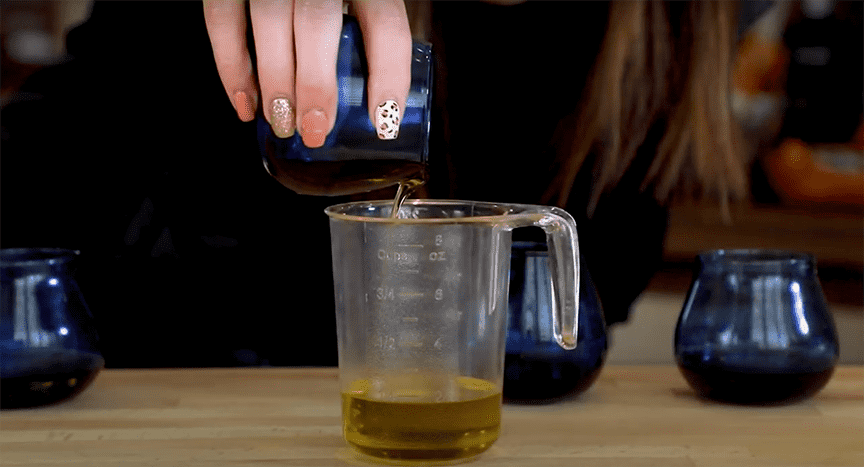
How To Store Olive Oil:
Another common question I receive, is how to properly store olive oil. The most important things to remember when it comes to extra virgin olive oil is that it is important to keep it in a dark cool place. Pasolivo chooses to paint our glass bottles completely black to block out the UV from the olive oil. We then recommend storing it in your pantry or cupboard.
You do not want to store your olive oil next to the stove or window. Light and Heat are key elements that will turn your olive oil faster. You also do not want to store your olive oil in the refrigerator. Many people think that by storing olive oil in the fridge, it slows the aging process. Unfortunately, it also causes the oil to solidify. When you bring the oil back to room temperature to liquify and repeat this process many times, it will start to break down the oil causing it to turn bad faster as well.

How To Cook with Your Olive Oil:
I also get many questions about cooking with olive oil. There is a common misconception that you cannot cook with extra virgin olive oil, but that is not true. High quality EVOO has a smoke point of up to 425 degrees, making it suitable for most of your cooking needs. So, when it comes to how to cook with real olive oil, I recommend using it on most of your dishes, not just for dipping or salad dressings. Please find some of my personal favorite ways to use olive oil in my cooking below:
• Scrambled Eggs
• Marinades (Olive Oil is also a meat tenderizer so it is excellent for marinating alongside your favorite spices)
• Baking (You can use olive oil instead of butter or vegetable in your baking recipes)
• Sautéing Vegetables
• In Sauces
• And much more!
If I didn’t answer your questions above, please feel free to comment with other questions, and I would be happy to respond or do additional posts on those topics!


